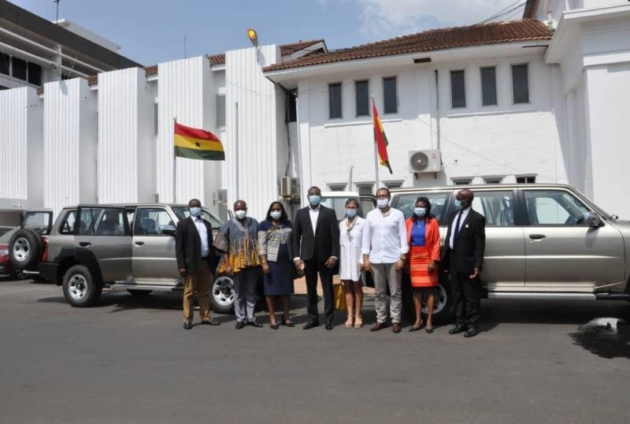The Accountability, Rule of Law and Anti-corruption Programme (ARAP) has handed over two vehicles to Commission on Human Rights and Administrative Justice (CHRAJ).
ARAP, an EU funded programme, implemented by the Spanish public foundation FIIAPP has been supporting the Commission during the last four years.
These vehicles will improve the capacity of CHRAJ to conduct monitoring activities related to the implementation of the National Anti-Corruption Action Plan (NACAP) on the ground.
A statement issued in Accra by Mrs Ana Sánchez, the ARAP Team Leader, said corruption continued to be a problem that had permeated every sector of global economies.
It said with its devastating effects, it undermined sustainable development and was an affront to human rights.
“It further distorts markets, competition, institutions as well as entire governance structures,” it said.
The statement said arguably, corruption was identified as a major root cause of poverty, deprivation and underdevelopment.
It said in the particular case of Ghana, the high prevalence of corruption has resulted in poor service delivery and a lack of access to necessities of life.
“Corruption is equally a threat to Ghana’s democratic ideals (particularly the rule of law, justice for all and equality before the law,” it said.
Ghana’s anti-corruption policy, the National Anti-Corruption Action Plan (NACAP) is coordinated and monitored by the Commission in collaboration with the National Development Planning Commission (NDPC).
Through the Monitoring Committee (MONICOM), composed of the above institutions, the vehicles will strengthen the committee's work in monitoring and evaluating the implementation of the NACAP by the Implementing Partners in the regions.
The ARAP supports the efforts of the government in its fight against corruption.
The objective of the programme is to contribute to current reform processes to reduce corruption and improve accountability, and compliance with the rule of law, particularly when it comes to accountability, anti-corruption and environmental governance.
It does so through support key institutions, while at the same time increasing the ability of the public, civil society organisations and the media to hold the government to account.
Latest Stories
-
Enimil Ashon: Whose polls do you believe: ‘Global Info or Prof Sarpong?
4 seconds -
Ghana Climate Innovation Centre welcomes 25 businesses into Cohort 10
5 mins -
ADB will continue to enhance customer value and service experience – Managing Director
7 mins -
Colour Cure Exhibition highlights art’s role in healing and advocacy
9 mins -
GPL 2024/25: Aduana FC sack coach Yaw Acheampong after poor run
12 mins -
John Dumelo pays ¢10,400 in outstanding fees for visually impaired law student facing deferral
13 mins -
CHRAJ clears Rev. Kusi Boateng of conflict of interest, says he doesn’t own 2 passports with different names
16 mins -
We’ll restore hope by cutting down taxes and avoiding unreasonable borrowing – Ato Forson
21 mins -
14th Edition of Tech in Ghana Conference launched in Accra
21 mins -
Manifesto clash: NPP, NDC spar over water, hygiene, sanitation and climate change
28 mins -
Ellembelle MP constructs new health facility at Santaso to serve several communities
32 mins -
Kwasi Appiah wanted to axe Ayew brothers and Wakaso from Black Stars – Ernest Thompson reveals
39 mins -
AngloGold Ashanti empowers PWDs in Obuasi East to harness 10-year socio-economic development plan
42 mins -
‘Dumsor’ won’t go anytime soon, we need 2 years to stabilize- IES
48 mins -
Black Stars Management Committee does a good job – Ernest Thompson
51 mins

